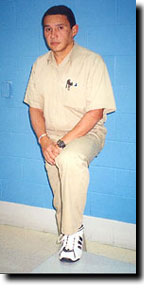Conspiracy to possess with
intent to distribute cocaine
Jamie Calle came to the United States in 1979 from Colombia,
"crossing the border to get the American dream." But
his dream soon became a nightmare. The dream was to work very
hard in the U.S. and send money to his children in Colombia.
He was able to do this by selling jewelry and Colombian clothing
in the New York area, and by purchasing veterinarian supplies
in the U.S. for shipment back to his native country.
Then one day he met a man, and after a few meetings, Calle agreed
to "get involved in the business of drugs." On June
7, 1993, the man arranged to pick up 8 kilograms of cocaine from
Calle, but little did Calle know, his "friend" had
been arrested a few days prior and worked a deal with special
agents that identified Calle as a supplier of cocaine.
Calle was arrested, and says, "I thought my life had ended.
I have lost everything, including my family."
In a plea agreement, the "United States agree(d) to recommend
that the defendant be sentenced at the low end of the applicable
guideline range," which, according to his attorney, would
have been 60 months. Before sentencing, Calle received his PSI
that stated his offense level was in the range of 87 to 108 months.
On September 9, Calle was sentenced to 120 months. He asked his
attorney what had happened to his plea agreement and was told
the laws were going to change and that he would be released soon.
He never saw his attorney again, and an appeal was never mentioned.
Upon arrival at F.C.I. Fairton New Jersey in 1994, Calle requested
copies of his court transcripts to determine why his sentence
had doubled. Despite no response, he continued to make transcript
requests in 1997, 1998 and in 1999.
Calle was told by the court in 1996 that he needed to send $3
per page before sentencing transcripts could be produced. In
1997 the court stated that the court reporter had "left
the court on disability," and that copies of his transcripts
were consequently unavailable. Calle persisted, but he was finally
denied in 1999 because "court reporters do use backup recordings
of their hearings, however, we are unable to locate any reporters
that are able to read (the original court reporter's) notes."
In May of 2000 the district court of Charlotte, North Carolina
certified that Calle's transcripts of the sentence hearing on
September 9, 1994 "cannot be produced."
Calle filed a 2255 motion, but the court stated the absence of
transcripts is not enough to support a constitutional violation.
Yet without transcripts, where does he begin in seeking justice?
Is this another 'catch 22' in our deeply flawed system of justice?
Calle says, "Can you believe this is happening in the United
States of America."
Back to the Wall
Next Prisoner of the War
on Drugs


